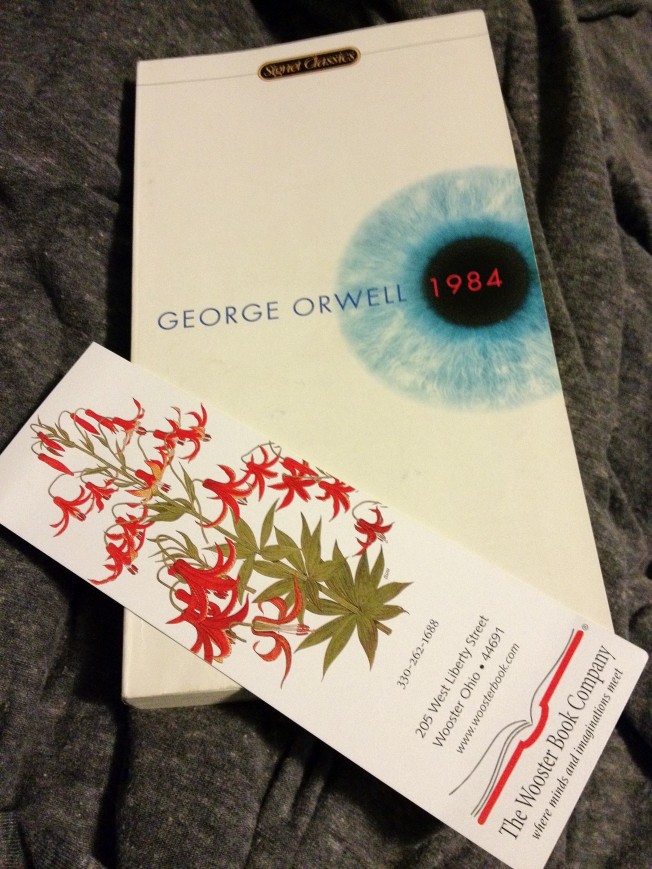I feel the desire to explain my last post a bit more and where I was coming from by addressing the title of this post, “much meaning lost between the pages in passing time.”
Books are a product of their time, similar to other media and art, and in a way they become relics of things forgotten, created in a time different than the present. Different in values, fears, hopes, dreams, desires, worries, economics, culture, and so on. The world changes constantly. All the time, always will. Music is a more obvious and immediate form of some of the changes that pervades the general consciousness more readily than other media.
All this is by way to say that 1984 meant something different in 1949 when it was first published, before the advent of personal computer and any glimmer of the Internet. But today, Big Brother’s systematic rewriting of history any time the Party chose to couldn’t happen. With Twitter and Facebook and the Internet in general, not to mention smartphones and texting, information cannot be controlled. Anyone can share anything anywhere, basically. Get on wifi and say or upload whatever you want, to anyone anywhere listening.
Yet privacy is an issue. And we freely self-report and broadcast what we do and where we are, to name a few of the plethora of possibilities now available. Whether you tweet on purpose and include your location or just the fact that your smartphone is turned on and broadcasting your triangulated location to satellites circling the Earth, you are sharing a lot of information about yourself. Even search engine are smart enough to learn about you based on your searches and links that you visit. Despite this, we live in a free society with freedoms that we take for granted such as free speech and free press in America. It not even conceivable to me that anything in 1984 could ever take place especially do to all the technology these days. And Big Brother has become a joke, a literal reality show, a British oddity with their surveillance cameras everywhere. Cop and murder TV shows and movies use those cameras to solve crime and portray them as useful and necessary to do good and catch the bad guys. While we invite TVs and computer screens and now tablets and mobile devices to make media pervasive and everywhere that we are, users have never had as much control over media as we do now. I am not bound by Castle‘s programming schedule because I can get in on Hulu.com whenever I want to watch it.
This isn’t the first time this issue of misunderstanding works from a different time crossed my mind. In high school, I watched Hitchcock’s The birds with my little sister and we couldn’t believe that it was originally billed as a scary horror movie. Really? It’s some bizarre birds randomly attacking people for no reason. Odd but certainly not terrifying–unless you fear birds, like my one friend. And it was campy to us. Sure, even in 2004, computer graphics and trying to out due gore and gross scenes pushed movies and shows to new visual feats. To us, scary and horror mention something totally different. And LOLCats doesn’t help:

So why read books from the past? There is a lot to still gain from anything ever written, be it beauty, content, history, a glimpse into a previous era. Same goes for all other art and media. Unlike in 1984, we keep things around to remember and ensure that the past persists, which exactly was what Ingsoc fought against–“Who controls the past controls the future; who controls the present controls the past.”
While I still stand by more post from yesterday, I will say that everything should be appreciated with the proper respect for the time in which it was created and what it meant to those then. Taking any work out of context does a great disservice to the current generations as well as the past and can certainly bode poorly for the future. Like the saying goes, don’t forget where you came from. Plus, those who can’t remember the past are doomed to repeat it.
Writing and storytelling mean I lot to me now. I’ve learned to appreciate a well crafted novel that makes you pause to savor a phrase or reread a passage that is witty and charming, or insightful and bold. Orwell doesn’t do that for me but is enjoyable none-the-less for his groundbreaking nature of topics and ideas. There’s always a writer behind the piece to consider. Why did they write what and how they did? What purpose did it serve then, and what can it now? Why create it at all, and what would it mean if it hadn’t been created ever?
Food for thought as Camp NaNoWriMo creeps up on us! I’ve got a new idea in mind, so we will see how June progresses!
Plus, for everyone wonder, what’s next on my agenda? Friday by my favorite sci-fi writer Robert Heinlein! It’s famous and been on my bookshelf at least a decade now, the pages are yellowing and even smell old already. Space action-adventure, yes please! Woot! In the first two pages alone, the main character kills a man, stuffs him in a locker, blasts a spying robot and shoves that in the locker too, stows away in a bathroom, and changes her identity–off to a quick start and it looks to be a great adventure. Such an anticipated read of mine that I’ve always held off to read it. No more. Reading it now! Headed to the porch to indulge.
